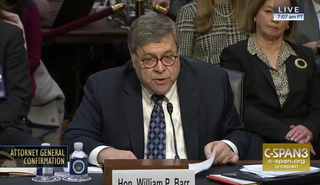Barr Shares Skepticism of Huawei, ZTE Tech

Attorney General nominee William Barr said Tuesday during his Senate Judiciary Committee nomination hearing that he shared concerns over the "danger" of using tech from Chinese telecoms ZTE and Huawei in U.S. networks.
He said when he was an exec (executive VP) with Verizon (in the early 2000s) the company already recognized that danger and would not use such equipment in its networks even though it was economically attractive.
ZTE and Huawei have been the targets of various government efforts to disentangle them from U.S. tech, though with some pushback from the White House in the case of ZTE.
Related: Barr: Not Sure Why Antitrust Didn't Take AT&T-TW Arguments Seriously
For example, government contractors can no longer buy equipment from Chinese telecoms ZTE or Huawei as part of those contracts, and must submit a plan for phasing out the use of that equipment from its systems.
Separately, the FCC is proposing to ban the use of broadband subsidy funds for ZTE and Huawei technology out of concern for national security.
The Trump White House has sent something of a mixed message.
Broadcasting & Cable Newsletter
The smarter way to stay on top of broadcasting and cable industry. Sign up below
Related: Barr Signals Silicon Valley Giants Deserve Scrutiny
After ZTE allegedly failed to comply with the terms of a settlement over illegally shipping telecom equipment to Iran and North Korea, Commerce banned U.S. companies from exporting their technology to the company for seven years. Not long after, the U.S. also banned the sale of phones from ZTE and Chinese telecom manufacturer Huawei on U.S. military bases.
But President Trump then instructed the Commerce Department to strike a deal that lifted the ban on U.S. tech exports after China's president reached out to him over the resulting Chinese job losses.
Barr told the Senate that China was a paramount economic and military rival and that he was also disturbed by the progress that country had made militarily on the back of U.S. tech.
Contributing editor John Eggerton has been an editor and/or writer on media regulation, legislation and policy for over four decades, including covering the FCC, FTC, Congress, the major media trade associations, and the federal courts. In addition to Multichannel News and Broadcasting + Cable, his work has appeared in Radio World, TV Technology, TV Fax, This Week in Consumer Electronics, Variety and the Encyclopedia Britannica.

